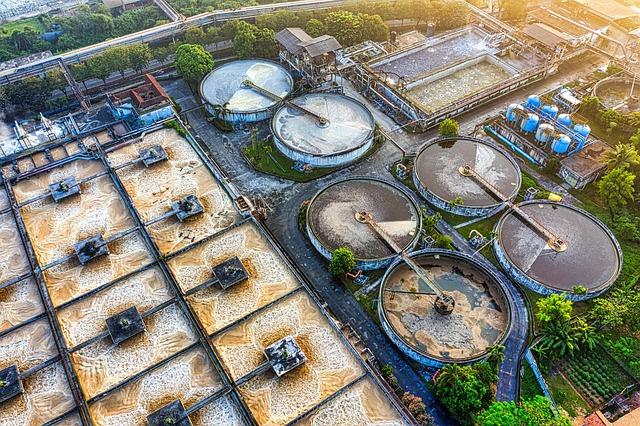Desalination: Tackling Water Scarcity in Melbourne
As climates change and urban populations continue to grow, water security has become a pressing concern for cities worldwide. Melbourne, known for its vibrant culture and picturesque landscapes, faces its own challenges in managing this precious resource. At the forefront of the city’s water management strategy is desalination—an innovative technology that transforms seawater into reliable, potable water. Operated by Melbourne Water, the city’s desalination plant stands as a critical component in the region’s efforts to create a resilient water supply, especially in times of drought. This article delves into the workings of desalination in Melbourne, exploring its benefits, challenges, and the pivotal role it plays in ensuring a sustainable water future for the community.
Exploring the Need for Desalination in Melbourne’s Water Supply
As Melbourne continues to grapple with the challenges of climate change and population growth, the need for sustainable water sources has never been more critical. With rainfall patterns becoming increasingly unpredictable, traditional sources of water supply are under threat. Desalination presents a viable choice, transforming seawater into potable water, thus ensuring a consistent supply. The benefits of implementing desalination in Melbourne’s water supply system include:
- Reliability: Provides a steady supply of water during droughts.
- Supplementary resource: Acts as a backup to natural water sources.
- Technological advancement: Involves state-of-the-art technology that improves efficiency.
Moreover, the environmental impact of desalination facilities is a crucial consideration. While the process can be energy-intensive, advancements in renewable energy technology may mitigate these effects. The following table summarizes key aspects of current desalination practices and their implications:
| Aspect | Current Status | Future Considerations |
|---|---|---|
| energy Source | Mostly fossil fuels | Transition to renewable energy |
| Cost per liter | Moderate | Potential reduction with advancements |
| Environmental Impact | Variable | Focus on sustainable practices |
Technological Advances in Desalination Processes Used by Melbourne Water
Melbourne Water has spearheaded innovations in desalination technology, substantially enhancing the efficiency and sustainability of freshwater production. Recent advancements focus on several critical areas:
- Energy Efficiency: Modern desalination plants utilize energy recovery devices that harness hydraulic energy, reducing overall power consumption by up to 60%.
- Membrane Technology: The latest reverse osmosis membranes offer improved permeability and resistance to fouling, which extends their lifespan and lowers maintenance costs.
- Smart Monitoring systems: employing IoT technology allows real-time monitoring and predictive analytics to optimize performance and reduce downtime.
Moreover, research into alternative desalination processes, such as solar desalination and zero-liquid discharge, shows promise for future scalability. Melbourne Water’s commitment to sustainability is reflected in its investments in:
| research Area | Description | Expected Outcome |
|---|---|---|
| Solar Distillation | Utilizes solar energy to evaporate seawater, minimizing fossil fuel dependency. | Lower carbon footprint in desalination processes. |
| Advanced Filtration | Developing new filtration techniques that enhance water recovery rates. | increased efficiency and reduced waste. |
| Brine Management | Innovating ways to treat and repurpose brine, a byproduct of desalination. | Minimized environmental impact and potential resource recovery. |
Environmental Impacts of Desalination: Balancing Water Demand and Ecological Health
Desalination has emerged as a critical solution for augmenting water supply, especially in urban areas grappling with increasing demand prompted by population growth and climate change. However, the extraction of seawater for desalination is not without its challenges. It leads to potential ecological disturbances, including the disruption of marine habitats. The process involves important energy consumption, contributing to greenhouse gas emissions, and poses risks of chemical pollution from the discharge of highly concentrated brine back into the ocean, which can alter local salinity levels. to effectively mitigate these risks, it is important to adopt practices that minimize negative impacts, such as:
- Monitoring environmental health: Continuous assessment of marine ecosystems affected by desalination plants is essential for understanding their impact on biodiversity.
- Selective intake systems: Implementing technology that reduces the intake of marine life can help preserve fish populations and other creatures vital to the ecosystem.
- System efficiency: Enhancing the energy efficiency of desalination processes can lessen the carbon footprint and associated ecological effects.
Moreover, collaboration between environmentalists, water authorities, and local communities is crucial in shaping policies that prioritize ecological sustainability while meeting water needs. A thoughtful approach integrates advanced technologies and best practices to ensure that the benefits of desalination do not come at the cost of marine health. For instance, the establishment of marine protected areas around desalination plants could provide sanctuaries for vulnerable species and habitats, fostering resilience in the face of changing climate conditions. Below is a comparison of conventional desalination methods and their more sustainable alternatives:
| Method | Energy consumption | environmental Impact |
|---|---|---|
| Reverse Osmosis | Moderate to High | Brine discharge, marine life intake |
| Multi-stage Flash Distillation | High | High energy use, thermal pollution |
| Solar Desalination | Low | Minimal impact, sustainable |
Economic Considerations: Cost-Benefit Analysis of Desalination in Melbourne
The economic feasibility of desalination in Melbourne is a critical consideration as the city grapples with water scarcity. A detailed cost-benefit analysis reveals several factors that influence both the financial and environmental sustainability of this water source. Among these are:
- Initial Investment: The construction and maintenance of desalination facilities require substantial capital. The upfront costs can be significantly high due to technological and engineering complexities.
- operational Costs: Energy consumption is a primary concern, as desalination plants typically require large amounts of electricity, impacting operational budgets and contributing to carbon footprints.
- Water Pricing: The cost of desalinated water can fluctuate based on energy prices, making it a less predictable choice compared to traditional sources such as rainwater and groundwater.
Despite these challenges, the long-term benefits of investing in desalination may outweigh its drawbacks.The potential advantages include:
- Water Security: Desalination provides a reliable and consistent source of potable water, essential for a growing urban population.
- Drought Resilience: By diversifying water sources, Melbourne can mitigate the impacts of climate variability, ensuring a stable water supply during dry periods.
- Job Creation: the advancement and maintenance of desalination infrastructure can lead to job opportunities in engineering, construction, and operations.
| Aspect | Importance |
|---|---|
| initial Investment | High |
| Operational Costs | Variable |
| impact on Environment | Considerable |
| Economic Viability | Promising |
Future Challenges and Innovations in Sustainable Desalination Practices
As water scarcity becomes an increasingly pressing global issue,the future of sustainable desalination practices hinges on innovative technological advancements. Breakthroughs in membrane technology and energy recovery systems offer promising solutions to enhance efficiency and reduce environmental impacts. Researchers are exploring nanotechnology to create more permeable membranes that require less energy to function, thus significantly lowering operational costs. The integration of renewable energy sources such as solar and wind power into desalination processes can further improve sustainability by decreasing reliance on fossil fuels and reducing carbon footprints.
Additionally, the development of environmentally friendly methods, such as forward osmosis and capacitive deionization, presents new avenues for desalination that are less energy-intensive and more adaptable to varying water quality. Collaborative efforts between public sectors, private companies, and research institutions will be essential to drive these innovations forward. fostering partnerships can lead to shared resources, knowledge, and investment in cutting-edge technologies that prioritize sustainable practices and ensure equitable access to clean water for all communities. The table below highlights potential innovations and their benefits:
| Innovation | Benefits |
|---|---|
| Nanotechnology | Improved membrane efficiency, lower energy consumption |
| Forward Osmosis | Requires less energy, adaptable to multiple water sources |
| Renewable Energy Integration | Reduces carbon footprint, promotes sustainability |
| Capacitive Deionization | Lower operational costs, reduced environmental impact |
Final Thoughts
Melbourne Water’s formidable commitment to desalination represents a pivotal strategy in ensuring the city’s water security amid changing climate conditions and population growth. The advanced desalination plant not only diversifies the region’s water supply sources but also stands as a testament to innovative engineering and environmental stewardship. By harnessing the vast resources of the ocean,Melbourne Water is pioneering a sustainable approach to water management that minimizes reliance on traditional freshwater resources. As Melbourne continues to evolve, the insights gained from the desalination process will undoubtedly inform future water policies and technologies. With ongoing investments in this critical infrastructure, Melbourne can forge ahead confidently, secure in the knowledge that its water needs are being carefully managed for generations to come.















How Trump’s Tariffs Transformed a Mexican Businessman into a Grateful Ally